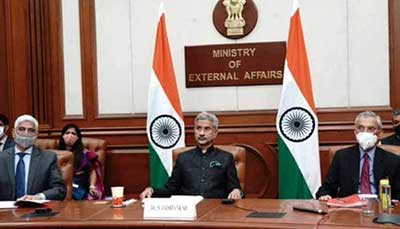India's virtual conference with five ministers from Baltic countries
On 5th November , India's External Affairs Minister S Jaishankar held a virtual conference with five ministers from Baltic countries . The participating ministers were from Finland, Iceland, Demark, Latvia and Estonia. Some of them, such as Estonia, are at odds with Russia, a close Indian ally, but all are acknowledged leaders in high-end manufacturing and innovation. Indian external affairs minister tried to explore the potential areas of partnership which included renewable energy and clean technologies, factories of the future, AI and block chain-led transformation, supply chain and logistics and fin-tech.
Now India aspires its drive to position itself in the centre as the world emerges from the Covid dislocation and Chinese aggression. That is why india is exploring news scopes from every corner of the globe.
What should India do to boost the ties :
India needs to take several initiatives – first, India needs to expand its presence in the Baltic and Nordic region by opening its diplomatic missions. All the three Baltic nations have embassies in India, while India’s relations are conducted through its missions in Warsaw (Lithuania), Stockholm (Latvia) and Helsinki (Estonia) which has led to a disjointed Indian approach towards the region.

Second, Baltic States are at the forefront of developing niche technologies, digital innovation and governance, areas where India is trying to gain a foothold. Estonia, for example, is one of the leading digital states of the world and has helped in setting European standards for data privacy and cyber-security. As India tries to take its own initiatives to regulate the cyber-space, it would benefit the country to enhance its dialogue and learn the best practices in this field.
Third, India and Baltic states can jointly explore the historical connect and common linguistic roots between them by enhancing the people to people relations. Many Lithuanian believe that their language traces its roots in Sanskrit.11 Moreover, the study of Indian languages (mainly Hindi and Sanskrit), Ayurveda, ISKCON movement, yoga etc. are famous in the region. Establishment of ICCR chairs on Indian Studies in Mykolas Romeris University and Vilnius University in Lithuania; Centre of Indian Studies and Culture at the University of Latvia; Centre for Baltic Culture and Studies, first in South and South East Asia, at Dev Sanskriti Vishwavidyalaya in Haridwar12, are some of the steps taken to invigorate the cultural connect between India and the region. Deepening people-to-people ties, along with fostering cultural exchanges and academic cooperation, will create a stronger and more stable foundation for Indo-Baltic ties.

The shared commitment to democracy, rule of law, and the promotion of peace and stability reinforces the convergence of Indian and Baltic strategic interests. To build upon this convergence, both sides need to establish closer dialogue on strategic issues and deepen their relationship across the political, cultural, and economic levels. By exploring the potential in several new areas of cooperation India can develop strong relations with these Baltic countries on bilateral bases as each of them have unique characteristics which could further contribute to the relationship.








